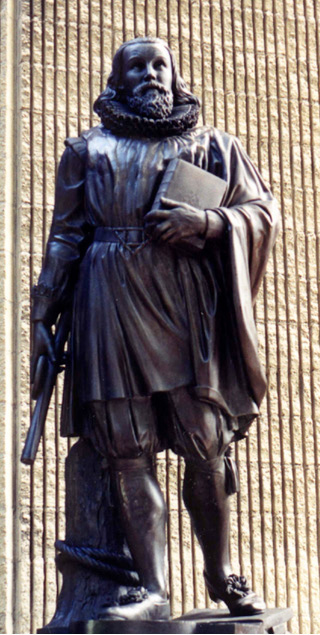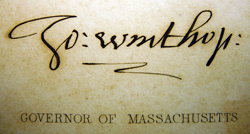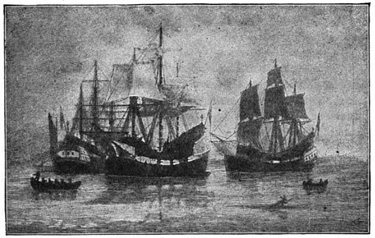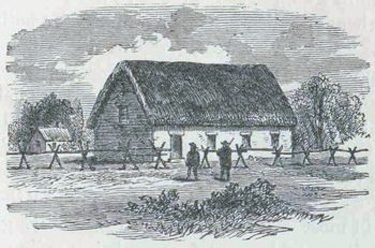 John Winthrop’s Journal [JWJ] and the Records of the First Church in Boston [FCB] together make excellent coverage of the ‘Errand in the Wilderness.’
John Winthrop’s Journal [JWJ] and the Records of the First Church in Boston [FCB] together make excellent coverage of the ‘Errand in the Wilderness.’

The JOURNAL of JOHN WINTHROP, 1630-1649
[Harvard University Press, 1996]
Excerpts from John Winthrop’s Journal concerning civil governance under the Magistrates & the Court of Assistants. The Journal text is enclosed in quotes, with the orignal underlining & spelling:
 p 39 [A grievous loss] Sept: 30, 1630
p 39 [A grievous loss] Sept: 30, 1630
“About 2: in the morninge mr Isack Johnson dyed, his wife the Lady Arbella of the house of Lincoln: beinge dead about 1 monthe before. [H]e was a holy man & wise [,] & died in sweet peace, leaving a goodesome parte of his substance to the Colonye.”
[Death and defections.]
Two of the officers in the Massachusetts Bay Colony [MBC] died in 1630 & another five returned to England, leaving only seven [total] magistrates to manage the colony into the spring of 1631. Of the 1,000 Immigrants, 200 died within the first year, & another 200 returned to England. [Editors]
p 66 [Disagreement over Term Limits in Office] May 1, 1632
“...the people intended at next general Court, to desire that [the] Assistantes might be chosen newe everye yeare: & that the Govenor might be chosen by the wholl Court & not by the Assistantes onely: upon this mr Ludlowe grewe into [a] passion, & sayd that then we should have no government, but there would be an Interim, wherin everye man might doe what he pleased &c.
this was answered, & cleared, in the judgement of the rest of the Assistantes, but he [Mr Ludlowe] continued stiffe in his oppinion, & protested he would then returne backe into England.
p 67 [Security] May 1, 1632
Capt. Underhill, who had been hired to train the colonial militia - & who had received Dutch military training. - came into disfavor with the Court & was sent out of Boston to Exeter NH.
p 69 [The city of Boston security] May 24, 1632
“The fortification upon the Corne hill [at the top of the present State Street] at Boston, was begune. Rockesbury [would be] the next & Dorchester the next.”
“the whale [a ship] carrying Mr Wilson [on his return from London] arrived May 26, 1632, and of 70 Cowes [there were] lost but 2.”
p 70 “The James...broght 61 heifers & lost 40.” June 12, 1632In the earely years of the ‘Experiment,’ it was unclear how separated the civil governing
officers would be from that of the Church Officers.
Beyond this, there were many Elders [ministers] in the several towns of the MBC, each of whom had an independent interpretation of scripture. Included among them were leading opponents of the Antinomians, the Familist sect who were charged with practicing communal marriage & ‘unfettered sexuality,’ ‘separatists’ [as at Plymouth] & even one who continued Roman Catholic sacraments. [LWC]
 p 71 [Separation of church & state.] July, 1632
p 71 [Separation of church & state.] July, 1632
“The Congregation at Boston wrote to the elders [ministers] & brethren [members] of the Churches of Plimouth, Salem, &c [and others, to ask] for their advise...
Questions.
1: whether one person might be a Civill magistrate & [nominated?] a Rulinge elder [of the Church] at the same tyme.
2: if not, then which should be layd downe.
3. whither there might be diverse [teaching & preaching elders] pastors in the same Churche.”
[FCB wanted Thomas Weld, in addition to John Wilson as ‘called’ Elders.]
Deputy Governor Thomas Dudley at the ‘newtown’ [Cambridge] church had no one.]
[Answers]
“the 1: was agreed by all negatively [a Church Officer could not serve as a magistrate]
the 2: doubtfully, [lay down the civil office]
the 3: doubtfull allso.” [but churches who could ‘afford’ multiple Elders - FCB had three - would do so, & include two or three deacons as well. All were chosen & ordained by the Church members.]
p 72 [Church discipline.] July 5
“The strife in [the] waterton Congregation continued still, but at lengthe they gave the separatistes a daye to come in, or else to be proceeded against.
at the [set] daye, all came in & submitted except Io:
masters, who, tho’ he were advised by diverse ministers & others that he had offended in turninge his backe upon the sacrament, & departing out of the Assembly &c. because they had then admitted a member, whom he judged unfitt, yet he persisted, so the Congregation (beinge lothe to proceed against him) gave him a further day: at which tyme, he continuinge gave him a further daye: at which tyme, he continuinge obstinate, they excommunicated him. but about a fortnight after, he submitted himselfe [to the judgement of the congregation], and was received in[to the fellowship of the congregation] againe.”
p 102 [Inflation] October 1 & 3 & November 8, 1633.
“The scarcetye [scarcity] of workmen caused them to rayse their wages to an excessive rate, so as a Carpenter would have 3 s[hillings,] the daye labourer 2 s[hillings]. ...those who had Comodtyes to sell [had] advanced their prices sometymes double to that they cost in England.
So as it grewe to a general Complaint, which the Court takinge knowledge of, as allso some further evills which were springinge out of the excessive rates of wages, [the Court] made an Order that Carpenters, masons, etc should take but 2 s[hillings] the day, and labourers but 18 pennys, and that no Comoditye should be sould at above 4 pennys in the shillinge more than it cost for readye monye in England.”